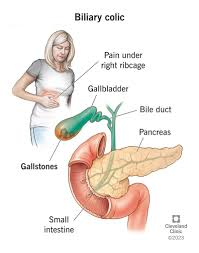The physician has seen the client and informed the nurse that the client is suffering from an episode of biliary colic. The nurse should check the medication record for a prescription to give:
A cream to soothe the itching.
Pain medication.
An antibiotic.
A laxative.
The Correct Answer is B
Choice a reason:
A cream to soothe itching may be used if the client is experiencing pruritus, which can sometimes accompany biliary issues due to bile salts in the skin. However, pruritus is not a direct symptom of biliary colic, which is characterized primarily by pain.
Choice b reason:
Pain medication is the appropriate treatment for biliary colic. Biliary colic is caused by the temporary blockage of the bile duct by a gallstone, leading to intense pain in the upper right abdomen or the center of the abdomen. Pain relief is typically achieved with anti-inflammatory drugs or antispasmodics, and in some cases, opioids may be necessary.
Choice c reason:
An antibiotic would be prescribed if there was an infection, such as cholecystitis or cholangitis. Biliary colic itself does not necessarily indicate an infection unless accompanied by other symptoms such as fever or elevated white blood cell count.
Choice d reason:
A laxative is not typically used to treat biliary colic. While laxatives can help relieve constipation, biliary colic is a result of gallstones obstructing the bile duct, not bowel movement issues.

Nursing Test Bank
Naxlex Comprehensive Predictor Exams
Related Questions
Correct Answer is C
Explanation
Choice A Reason
The continuous nature of the mucosa refers to the uninterrupted lining of the urinary tract, which provides a barrier against pathogens. However, this characteristic is not a significant factor in the increased susceptibility of women to cystitis. Both men and women have a continuous mucosal lining, and it does not account for the gender difference in infection rates.
Choice B Reason
High estrogen levels can influence the tissues of the urinary tract and may affect susceptibility to infections. However, the role of estrogen in the development of cystitis is not as direct or significant as anatomical differences. Estrogen levels vary throughout a woman's life and do not consistently correlate with cystitis risk.
Choice C Reason
Urethral proximity to the rectum is the most significant anatomical factor contributing to a woman's increased susceptibility to cystitis¹⁴. Women have a shorter urethra than men, and its close proximity to the anus allows bacteria from the bowel area to more easily enter the urinary tract and cause infections.
Choice D Reason
Inadequate fluid intake can lead to less frequent urination, which is a risk factor for cystitis because it reduces the natural flushing of bacteria from the urinary tract. However, this is a modifiable risk factor and does not inherently explain the higher incidence of cystitis in women compared to men.
Correct Answer is D
Explanation
Choice A reason:
Administering oxygen using a non-rebreather mask is a subsequent step if initial measures do not improve fetal heart rate decelerations. It can help increase the amount of oxygen available to the fetus. Oxygen administration is a supportive measure that can be used if there are signs of fetal distress. In the scenario described, where the fetal heart rate slows after the start of a contraction with the lowest rate occurring after the peak, it suggests late decelerations, which are often associated with uteroplacental insufficiency. Administering oxygen can help increase the fetal oxygen reserve and is a common intervention during labor when there are concerns about fetal well-being.
Choice B reason:
Increasing the rate of maintenance IV infusion is typically considered when there is a concern for maternal hypotension or dehydration, which may not be the immediate cause of the observed fetal heart rate pattern. Increasing the rate of an IV infusion can help improve maternal hydration and blood pressure, which in turn can enhance placental perfusion. However, this intervention is more indirect and may not provide the immediate response needed to address fetal heart rate decelerations. It is typically considered after more direct interventions, such as repositioning the mother, have been attempted.
Choice C reason:
Elevating the client's legs can help improve venous return to the heart, potentially increasing maternal cardiac output and blood flow to the placenta. While this can be beneficial, it is not the primary intervention for late decelerations. Repositioning the mother to improve uteroplacental circulation is generally the first step.
Choice D reason:
Placing the client in the lateral position is often the first action taken when late decelerations are observed. This position helps improve uteroplacental blood flow and can quickly address potential issues related to fetal oxygenation. This position helps to relieve pressure on the inferior vena cava and aorta, which can be compressed by the gravid uterus, especially in the supine position. Relieving this pressure helps to improve uteroplacental circulation and can quickly address the cause of late decelerations, which is often related to compromised blood flow to the placenta.
Whether you are a student looking to ace your exams or a practicing nurse seeking to enhance your expertise , our nursing education contents will empower you with the confidence and competence to make a difference in the lives of patients and become a respected leader in the healthcare field.
Visit Naxlex, invest in your future and unlock endless possibilities with our unparalleled nursing education contents today
Report Wrong Answer on the Current Question
Do you disagree with the answer? If yes, what is your expected answer? Explain.
Kindly be descriptive with the issue you are facing.
